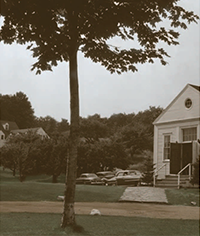This summer, a select group of teenagers are experiencing the intellectually challenging academic environment and rewards of a college course, more specifically a college course at Marlboro. Two weeklong seminars, led by philosophy professor William Edelglass and politics professor Meg Mott, are the first in a series of pre-college summer programs designed to give local youth the opportunity to study directly with faculty members and a group of other students passionate about learning.
“What does it mean to grow your food in a world where most of what we eat is produced by machines?” asks Meg, whose course this summer is called Eating Against the Machine. Students in her course will explore the connections between economics, politics and food, splitting their time between hands-on visits to farms and big-picture conversations. William’s course, Philosophies of the Wilderness, will give students the opportunity to reflect together on their relationship to “wilderness” and the moral dimensions of living with animals and ecosystems, as well as with other humans.
“These programs are great preparation for college, priming young minds and souls for life in an academic community and beyond,” said Ariel Brooks, director of non-degree programs. They complement other Marlboro programs designed to open doors for local teens, such as free classes for area high school students and Friday Night (rainbow) Lights, a drop-in group for lesbian, gay, bisexual, transgender, queer and questioning (LGBTQQ) teens held at the Marlboro College Graduate School.
At the other end of the undergraduate years, Marlboro has made a concerted effort to make the graduate school more accessible and relevant to students on Potash Hill. The dual degree program allows students to build on their academic interests and earn a marketable graduate degree within a year or two of college graduation. In most cases, students can take graduate classes while still undergraduates, enabling them to start their graduate program ahead of the game and reduce their credit fees.
“Marlboro College’s dual degree program is the best of both worlds,” said Ariel. “Students in the program can continue their Marlboro studies on their own terms, knowing that the graduate school will allow them to apply their academic experience to a career in education, business or nonprofit management.”
Graduate programs offered through the dual degree program are the Master of Arts in Teaching for Social Justice, the Master of Arts in Teaching with Technology, the Master of Science in Managing Mission-Driven Organizations and the MBA in Managing for Sustainability. Marlboro students will find many familiar features at the graduate school, including small classes, self-directed learning, project-based work and a focus on clear communication.
“I wanted the same level of creative and critical thinking in a teacher certification program that characterized my undergraduate experience,” said Amanda DeBisschop ’10, who is enrolled in the teaching for social justice program. “The faculty is completely dedicated to educating active and effective teachers, and the students are determined to learn what good teaching looks and feels like.”

